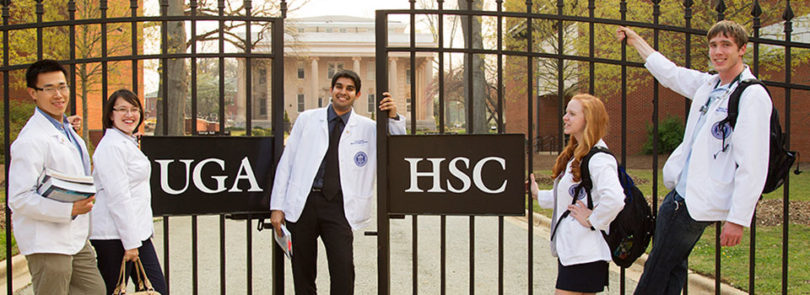The crowd begins the countdown-10… 9… 8…-and as the voices crescendo to 1, students from the Georgia Regents University/University of Georgia Medical Partnership grab envelopes off a table and rip into them. Woo-hoos, yeahs, screeches and whoops fill the auditorium as the graduates learn where they will be spending their residencies and celebrate the first Match Day-a rite of passage-in Athens on the University of Georgia’s Health Sciences Campus.
The noontime scene next door is calmer but still crowded as students line up to wait for an open seat in The Niche. UGA’s newest dining commons lures students with ribeye steak sandwiches, skirt steak, crab cakes and gelato, among other items. Soon, the line stretches to the door as a UGA bus drops off students, some of whom have traveled about two miles from the main campus to eat at the HSC on Prince Avenue.
Some medical students have moved outside to the sidewalk, where College of Public Health students and professors are walking to class or to conduct research. The medical students continue to celebrate Match Day by hugging, kissing and spreading the news via FaceTime, and one student shares his second piece of big news with a classmate, saying, “We just got engaged,” as his new fiancée smiles and sobs.
These moments are milestones on the cozy campus, which opened in 2012. UGA acquired the 56-acre site in 2011 after the U.S. Navy Supply Corps School, which previously occupied the buildings, was decommissioned by the federal government in 2010 and its operations moved to Rhode Island. UGA renovated the site to house the College of Public Health and the GRU/UGA Medical Partnership. Students can attend classes, participate in research, socialize and eat there, work out at the gym and live in townhomes or residence halls on the campus.
“It’s a stand-alone campus,” says Phillip L. Williams, dean of the College of Public Health, adding that the campus will eventually allow public health to bring all of its units together in one place.
And it’s becoming a place where students from multiple UGA colleges and schools are learning and mingling with GRU/UGA medical students. College of Public Health researchers have received $8 million in funding for fiscal year 2013 with more than $30 million in total active grants.
As construction continues to make more classroom space, both Williams and Barbara Schuster, campus dean of the GRU/UGA Medical Partnership, see more prospects for medical students, public health students and faculty to interact on research projects and community outreach. The College of Public Health and Medical Partnership also offer a joint accelerated MD/MPH degree, and an MBA/MPH program, a joint venture of the College of Public Health and the Terry College of Business, is launching this fall. Public health students and first-year medical students also take a community health course together.
Osama Hashmi, a UGA Honors student who plans to attend medical school, sees how having the HSC is creating meaningful connections in his public health courses.
“Having the medical school professors available right there makes it easier for them to come and talk to our classes.”
Plus, he adds: “It has the best dining hall at UGA.”
New venture, familiar surroundings
As students’ names-and the occasional Optimus Prime and Obi-Wan Kenobi-are called out to pick up their lunch at The Niche, GRU/UGA medical students on this spring day are passing the microphone as they call out Duke, Minnesota, Louisville, Emory and other medical programs where they will be residents. St. Mary’s Health Care System could join the celebration as early as next year as it becomes Athens’ first medical residency program. St. Mary’s internal medicine residency program is a joint effort with the GRU/UGA Medical Partnership; meanwhile, graduate medical education or residency programs at Athens Regional Medical Center are expected to begin in 2016 and possibly at other northeast Georgia hospitals.
“I think it’s a very big deal. It’s another step in the growth of the [GRU/UGA partnership] to have a residency program,” says Carlos Soriano, class president of the GRU/UGA Medical Partnership Student Medical Association.
Expanding medical education will ensure that more physicians educated in Georgia will remain in the state to complete their initial residency training, according to a 2008 report commissioned by the board of regents. St. Mary’s Health Care System was awarded $550,000 in GME funding as part of Gov. Nathan Deal’s program to fund more than 400 new residency positions at hospitals that do not have those programs.
Five years ago, there was only an occasional medical student rotating in a northeast Georgia hospital or with physicians, Schuster says. Now, medical students-each class has about 40-work with more than 250 physicians in Athens, metro Atlanta and up to the North Carolina border, including both Athens hospitals and nine other medical centers.
“Just having medical students beginning in northeast Georgia is a huge impact,” she says. “There’s definitely an opportunity and a place for those students.”
Georgia ranks 44th in the nation for physicians per 100,000 people, and St. Mary’s officials believe they can help improve those numbers.
“We feel part of our mission and vision is to be responsible in that way to the community, to northeast Georgia, and to ensure that we have future physicians to take care of us,” says Dr. Bruce F. Middendorf, St. Mary’s chief medical officer and director of the system’s GME program. “At the end of that time, these physicians are well-trained and prepared to go out to care for patients on their own.”
St. Mary’s internal medicine residency will have 30 total residents, which breaks down to 10 per year starting in 2015. Dr. Michelle A. Nuss, campus associate dean for GME with the Medical Partnership and interim program director for the internal medicine residency program, says she receives emails daily from students interested in the Athens residency programs.
Athens Regional plans to have five residency programs with 102 new trainees, which will transform the way in which it cares for patients, says Dr. Jonathan Murrow, who is heading up the development of these programs.
On-the-job training
Amy Martin is in the first group of Medical Partnership students that graduated in May. She says she believed that her class had an obligation to give back to the community. Mercy Health Center, a free clinic just a couple of blocks from the HSC, opened its doors to the medical student volunteers, who joined UGA students from public health and pharmacy already volunteering at the site.
“It showed just a lot of fortitude and a lot of drive in my classmates,” says Martin, wearing a white lab coat and stethoscope around her neck during a Wednesday night clinic. “There was no stress because it wasn’t like you were getting graded. You got to go take care of patients and realize, ‘This is what I signed up for.'”
As a result of the student volunteers, Mercy now is open three nights a week instead of two, and patients no longer have to wait weeks for help.
“Students are learning, Mercy is thriving and patients are getting better,” Executive Director Tracy Thompson says.
By spending time in the clinic, public health, medical and pharmacy students see how working together can improve care.
“Seeing the value of what a pharmacist can do, I think, has really enhanced the opportunities for the medical students,” says Dr. Trina von Waldner, director of postgraduate continuing education for the College of Pharmacy.
Our campus, your campus
For medical school, Matthew Lustig, who received his bachelor’s degree from UGA in 2012, only had to move across Athens, where new Normaltown neighborhood gathering spots and eateries have opened and Ike & Jane Café and Bakery has added dinner hours since the students arrived.
“There was no adjustment necessary. Whereas some people had to move states, and other people were working and not in school, this has just been a straight progression,” says Lustig, class of 2016, who lives on campus.
As Travis Smith takes the next step in his medical career with a residency in Denver, he can’t help but grin when talking about his medical education and how the opportunities are increasing for future students. Grabbing a cup of coffee after working all day with a family medicine group in northeast Georgia’s Habersham County, he says: “There are many students just like me who are motivated and want to learn, and this is a great place for us to learn.”




